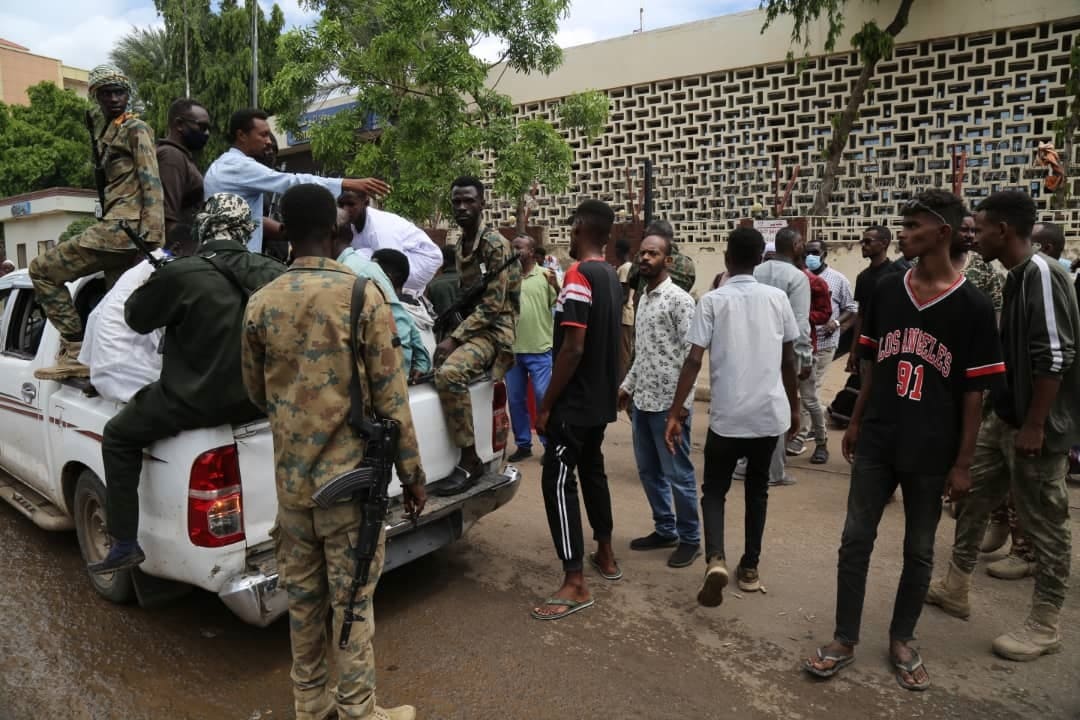Omdurman, Ed-Debba, July 12, 2025 – Sudanile
Issam Abdelrahman (a pseudonym used for security reasons) never imagined that escaping the horrors of war in Omdurman would lead to nearly three months of arbitrary detention in Sudan’s Northern State — without trial or formal charges.
Issam, a displaced person who had settled with his family in the town of Ed-Debba, was stopped on March 23, 2024, by military intelligence while driving his car. He was verbally informed that there was a report accusing him of “supplying fuel to the Rapid Support Forces (RSF).” No arrest warrant or physical evidence was presented. According to his family, the accusation likely stemmed from an anonymous tip-off as part of the “Report a Collaborator” campaign that had been intensifying on social media at the time.
Arrested on Suspicion Alone
Issam’s sister told Sudanile: “He had no political or military activity. He was simply trying to rebuild his life after displacement. Suddenly, he found himself accused, detained, and we were denied access to visit or even learn his whereabouts.”
Despite the family’s attempts to appoint a lawyer, and despite the attorney general’s office publishing periodic detainee lists, Issam’s name never appeared, nor was he ever brought before a court. His fate remains unknown.
The “Report a Collaborator” Campaign: From Accusations to Eliminations
Sudanile monitored numerous posts on social media — particularly on Facebook pages such as “Report a Collaborator,” “Report a Collaborator in Your Area,” and “Report a Civilian Collaborator.” A backup page run by a figure known as “Officer Wad Al-Mustafa” regularly posts names, photos, and personal information of civilians accused of cooperating with the RSF, explicitly calling on military and security forces to “take appropriate action.”
According to observers, these pages promote politically and socially motivated denunciations, targeting students, women, and entire families — particularly in cities like Atbara, Madani, and Khartoum — using inflammatory labels like “traitors,” “remnants,” and “collaborators,” without any legal evidence. Emergency lawyers say such campaigns are gross violations of the presumption of innocence and have already led to arbitrary arrests and extrajudicial killings based on affiliation or location, not credible evidence.
A War Without Clear Frontlines… and a Battlefield Open to All
Dr. Ibrahim Kabashi, a political science professor, sees the “Report a Collaborator” campaign as part of the chaos spawned by the war. He told Sudanile: “We are living in a time of daily persecution and shifting labels. Every actor on the ground is creating new terms to serve political or social agendas. The war is now beyond the control of the main parties, and anyone with a motive can exert influence.”
Kabashi adds that civilians now live in a constant trade-off between safety and access to food, between survival and forced allegiance to whoever controls their area — producing layered violations rooted not in conviction, but in imposed necessity.
Militarization and a Climate of Vengeance
Kabashi stresses that war has militarized society with no safeguards, amid the near-total absence of military or civilian justice systems. Circulating information has become a weapon to settle scores based on social, political — or even sporting — divisions. People are judged based on old perceptions or personal grudges. With hate speech on the rise, the law has disappeared, replaced by regional and ethnic profiling. Trust in legal institutions has collapsed, and the reach of repression has extended far beyond the war zones.
An Informal Campaign with a Free-Flowing Media Weapon
Lawyer Mohamed Salah from the “Emergency Lawyers Committee” explained that the campaign was not initiated by legal or official institutions, but by army supporters using social media. These platforms have posted lists of civilians labeled “collaborators” simply because they live in RSF-controlled areas.
In an interview with Sudanile, Salah said: “Civilians became trapped between two fronts — the RSF, which restricts them, and army supporters who accuse them. These campaigns have no legal basis and are used as a pretext for arbitrary detention or even execution without due process.”
He added that trials in army-controlled areas fall far short of fair trial standards. Dozens are being held without access to lawyers or timely court hearings. Some detainees have been in custody for over a year without their cases being reviewed — a clear violation of the law.
A Threat to Social Cohesion
Political analyst Mohamed Tourchin warned that the campaign poses a serious threat to social cohesion. Labeling entire groups as collaborators with one side of the conflict could fuel ethnic tensions and lead to uncontrollable revenge cycles, especially given the weakened state and collapse of the rule of law.
Tourchin told Sudanile that these campaigns are sending a bleak message to the international community — portraying Sudan as a country where justice and institutions have collapsed, and war is being waged through Facebook pages.
All three experts agreed that Sudan is in a critical phase. Confronting this breakdown requires the restoration of judicial institutions, activation of both military and civilian courts, an end to incitement campaigns, and the guarantee of fair trials.
The Sudanese Media Forum and its member organizations are publishing this report, prepared by Sudanile, to shed light on incitement campaigns on social media and their use as tools for political and personal vendettas and the spread of hate speech in the absence of a functioning state.
